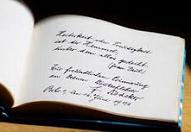 A message that is pronounced with the intention of expressing an idea, a feeling, etc. is called a speech. This is a presentation that can be made in writing or orally. The poetic , on the other hand, is that linked to poetry (an expression that is made with an aesthetic sense).
A message that is pronounced with the intention of expressing an idea, a feeling, etc. is called a speech. This is a presentation that can be made in writing or orally. The poetic , on the other hand, is that linked to poetry (an expression that is made with an aesthetic sense).
Poetic discourse , therefore, is one that has an aesthetic purpose and that uses literary resources and word games to achieve it. Although it is usually related to poems , poetic discourse can also be developed in prose.
Generally, this type of speech seeks to generate empathy with the recipient, who can feel identified with what is expressed beyond the different circumstances. This is because poetic discourse usually refers to universal themes (such as happiness, love , nostalgia , etc.).
Another characteristic of poetic discourse is that it proposes a particular vision of the world . It is not focused on objective reality, but, by appealing to emotions and aesthetics, it relates to reality in a special way. The authors often turn to experimentation both in content and form to give rise to structures that are novel.
This distinguishes poetic discourse from an informational text, in which writers pursue objectivity over their own opinions. In any case, it is true that no one can be one hundred percent objective, so in any literary creation there are limits that respond to the experiences, knowledge and tools of the authors.
A poetic speech, for example , could indicate: «In colonial times, a group of immortal heroes rose up against the tyrant in pursuit of freedom, drinking the nectar of rebellion. The feat was a success and opened the doors of Olympus to these brave warriors of independence . A historical speech, on the other hand, would point out the same events: "In 1810, a group of patriots rebelled against the imperial government to achieve freedom..." .
 It is important to highlight that poetic discourse should not be excessive, or at least that excess is not in its essence. Although we can describe an overly ornate text as poetic if it meets the appropriate requirements, it is always possible to express the same idea with fewer words, in a more concise and accessible way to any reader.
It is important to highlight that poetic discourse should not be excessive, or at least that excess is not in its essence. Although we can describe an overly ornate text as poetic if it meets the appropriate requirements, it is always possible to express the same idea with fewer words, in a more concise and accessible way to any reader.
Precisely, one of the most common problems with overly flowery poetic discourse is that only a small portion of the public has the linguistic tools to understand it. Art is not a property of a few but rather a meeting point that should invite us all to share experiences and feelings; When we turn literature into a source of academic creations , we do nothing other than surround it with impenetrable barriers, thus preventing it from developing and enriching itself.
We must not forget that the people who created poetry had not studied at a college, nor did they have a series of encyclopedias that defined concepts such as poetic discourse ; However, it is these gems from the past that support the pillars of this art form, the same one that academies strive to structure, in an absurd attempt to decipher its formula to reproduce it at will.
This leads us to another reality that is difficult to accept: we can learn to recognize and interpret a poetic text, with certain limitations, but not to create it spontaneously, with art, since that can only be done by people who were born with the appropriate talent . , those who begin to write before walking, without needing to receive knowledge from teachers in suits.
